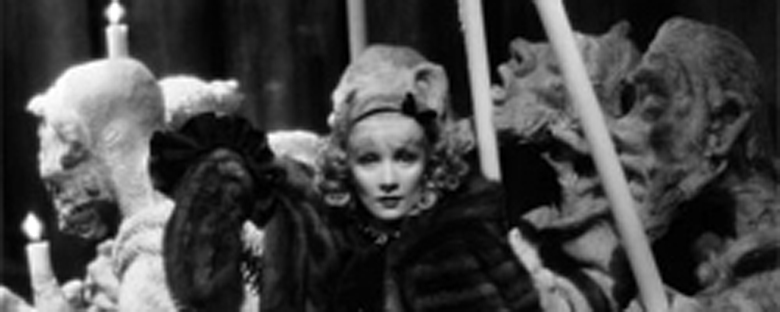Reviews
Josef von Sternberg
USA, 1934
Credits
Review by Beth Gilligan
Posted on 10 November 2005
Source The Criterion Collection DVD
From the outset, The Scarlet Empress sounds like the ideal Marlene Dietrich/Josef von Sternberg collaboration. The sixth of their seven efforts together, the film traces the rise to power of Princess Sophia Frederica, who would come to be known as Catherine the Great. Given Catherine’s well-documented ruthlessness and voracious sexual appetite, Dietrich seems custom-made to play the role, but as it turns out, the first half of the movie places great emphasis on Catherine’s early years, relying on the actress to channel a childlike innocence that is laughably beyond her grasp.
In an essay accompanying the Criterion DVD of the film, Robin Wood ruefully notes the movie’s appropriation as a camp classic, and strives to explain why it should instead be considered a “profoundly serious work,” but the over-the-top set design, defiantly anachronistic dialogue, and scenery-chewing performances all conspire against this interpretation. This is not to suggest the film should be dismissed out of hand—the exaggerated, twisty Gothic furniture that adorns the palace proves the ideal canvas for von Sternberg’s dramatic lighting compositions, and it contains some astonishingly well-choreographed scenes that emphasize the gilded cage young Sophia is trapped in.
The rest of the film, however, is as uneven as Dietrich’s performance. It begins on a jarring note, as Sophia’s doctor regales her with graphic bedtime tales of torture and hangings, which are accompanied by shocking (especially by the era’s standards) images of the same. Soon after, Sophia, whose hair is fashioned in blonde, Shirley Temple-style ringlets (a look Dietrich unsurprisingly chose not to replicate later in her career), is dragged off to Russia to meet her intended husband, Grand Duke Peter (played by an amusingly creepy Sam Jaffe). To her dismay, Peter turns out to be a repulsive half-wit whose affections lie elsewhere. Forced to change her name, her religion, and marry a man she despises, Sophia’s trembling innocence slowly begins to crumble, and she sets about using her education and beauty to her advantage, eventually overpowering her hapless husband.
While Dietrich makes a wholly convincing conniver, von Sternberg shows little interest in bridging the gaps between the wide-eyed Sophia and the steely Catherine. The movie abruptly lurches between emphasizing her victimhood and portraying her as a willful manipulator of men, with Peter’s mother, the Empress Elizabeth, providing occasional commentary along the way. The latter is one of the film’s highlights, as Louise Dresser, who plays the Empress with domineering gusto, makes no attempt to disguise her flat Midwestern accent, dishing out advice with the no-nonsense manner of a 1930s barmaid. The Scarlet Empress is also audaciously sexual given the time in which it was made; unfortunately, this does not translate into the kind of sensuality that the teaming of Dietrich and von Sternberg showed itself capable of in other films.
We don’t do comments anymore, but you may contact us here or find us on Twitter or Facebook.



